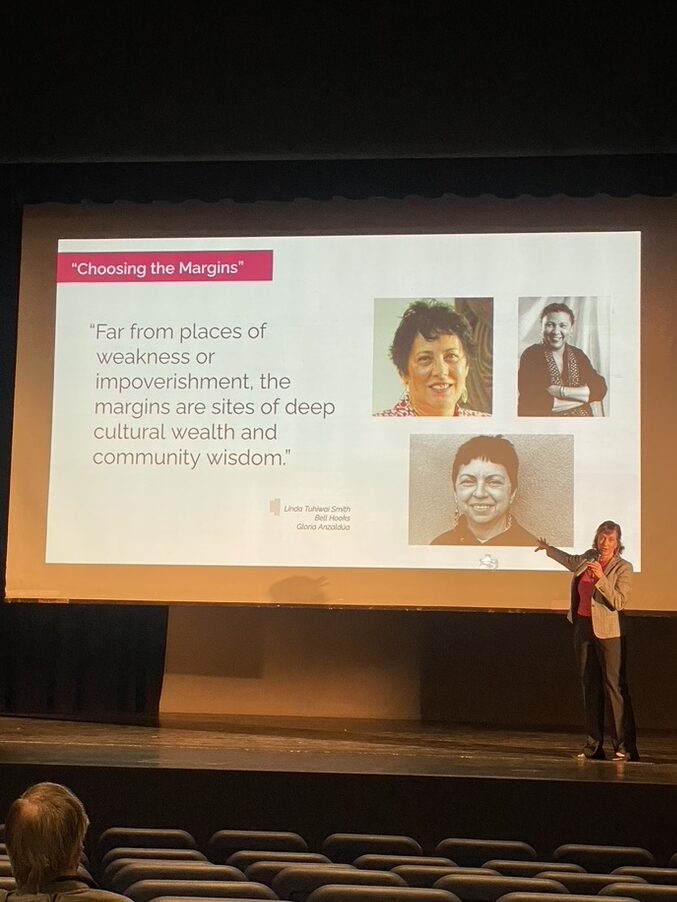
Shane Safir (pictured above giving her Keynote),
I had the privilege to attend another Professional Development session hosted by School District 57 on October 20th.
Her introduction was quite interesting. She identifies as a queer woman but also explained that Safir, when used as a noun, means scribe in Hebrew.
This seemed irrelevant to me, but it was quite impactful by the end. What information do we use to describe ourselves? If she wasn’t doing a keynote or practicing as a teacher, would she describe herself as a scribe?
She then made us think of ourselves as learners; this is who we are after all… how else would a teacher describe themselves? But now I see many possibilities depending on what is important in that particular teacher’s pedagogy. What data do we use to describe ourselves? A simple statement like “by name, I am a scribe” makes it so much more impactful that she is there giving us that lecture as our teacher for the day. Would this simple introduction help me understand the rest of her keynote and open me up to a better understanding?
“Street data” to Safir is “data that cannot be measured but it’s valuable”. The data that can be measured and it is usually presented as the one-and-all to understand students and schools is the “big data”. This big data includes tests and grades only; they are questions answered “correctly” and produce a bell curve.
Street data includes “the missing insights missing from big data” – Trisha Wang.
These particular data sets include:
- Abundance mindset: such as joy, wellbeing, dignity, student voices, etc.
- Agency: efficacy, mastery, belonging, identity.
- Authentic assessment: this is done for the individual students and usually by the students to prove their knowledge their way
This amount of agency can be messy for assessment and takes a lot of time. It can also be unpredictable and it requires the teacher to RELINQUISH CONTROL. This is particularly hard for most teachers. However, the students deserve to have the chance to feel identity within their learning. Student agency is a crucial skill as they enter the “real world”. Memorizing information is necessary for scaffolding knowledge, but the students should be able to choose how they memorize it and present it.
Dr. Sidney Stone Brown says that counting creates measurement, which creates a hierarchy. “With student agency, we can BE instead of measure”.
During her presentation, she left us with various questions. I would like to say what the questions were and a simple answer. If you have the chance to read this blog, I would like for you to think of these questions and adapt them to your pedagogy and how we teach. All answers will be different and mould themselves to serve us better.
- What is the dominant language of data in our field?
- What does it sound like?
- How are standardized tests constructed?
- What is the purpose of education anyway?
I would like to say as a scientist that data has multiplied exponentially in the past 100 years. The amount of information we are asking students to learn in high school is the same amount, or sometimes more, than a professor in the late 1890s and early 1900s. The branches of science have become overwhelming and we expect students to know university-level material by grade 12 before entering university.
There is a problem when we focus on only academics and knowledge. For example, my doctor friends complain that they do not know how to run their personal lives and lack certain social skills because as they say, “I did not have time to live! I had so much to study”. This is good for a doctor as we want people to know what they are doing, but what about that person’s interpersonal skills? How will they approach empathy and know about diversity? Will they be able to rent a car or know how to get a proper mortgage?
There is one particular skill I would have wanted when studying, how am I happy? What is the measurement for happiness? When I graduate high school? When I finally move out? When I finish my degrees needed for a job? When I get a mortgage? When I get married? When I have a steady job? When I retire? When… Can learning immense amounts of data answer these questions and are they important to making a “good citizen”?

A picture I took after the presentation. It seemed like they were organizing themselves and telling me to organize my learning into a row to lead me in the right direction.